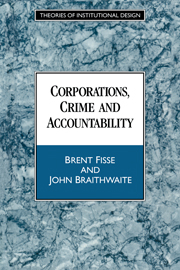Book contents
- Frontmatter
- Contents
- Preface
- Abbreviations
- 1 Crime, Responsibility and Corporate Society
- 2 Individualism
- 3 Enterprise Liability
- 4 Organisation Theory Perspectives
- 5 Making the Buck Stop
- 6 Assessing the Accountability Model
- 7 The Possibility of Responsibility for Corporate Crime
- Bibliography of Cited Works
- Index
4 - Organisation Theory Perspectives
Published online by Cambridge University Press: 11 March 2010
- Frontmatter
- Contents
- Preface
- Abbreviations
- 1 Crime, Responsibility and Corporate Society
- 2 Individualism
- 3 Enterprise Liability
- 4 Organisation Theory Perspectives
- 5 Making the Buck Stop
- 6 Assessing the Accountability Model
- 7 The Possibility of Responsibility for Corporate Crime
- Bibliography of Cited Works
- Index
Summary
Organisation Theory and Allocation of Responsibility
A good theory of organisational behaviour might supply some guidance as to who or what to hold responsible for organisational crime. If we understood how organisations decide to break the law or how they drift into breaking the law, we might be able to prescribe legal accountability principles which are consonant with organisational realities. It was this insight which led Kriesberg to the view that ‘[t]he basic problem is that the law is not founded on an understanding of the decisionmaking process that the law must shape in order to deter corporate lawbreaking.’
In this chapter, we look at the implications for individual and corporate legal responsibility of a number of alternative conceptions of organisational structure and functioning. We then consider four alternative strategies for harmonising these conceptions of organisational structure and functioning with legal accountability principles for corporate crime. Four typologies of organisational life will be considered: one based on models of decisionmaking; one on the structuring of organisations; another on role-taking in organisations; and another on the ways organisations assign internal responsibility for wrongdoing. The first is based on Kriesberg's decisionmaking models in organisational life.
First Cut: Kriesberg's Decisionmaking Models for Organisational Action
Simeon Kriesberg has produced an analysis of corporate decisionmaking based substantially upon Graham Allison's Essence of Decision: Explaining the Cuban Missile Crisis. Three models of corporate decisionmaking are advanced. Model I, the Rational Actor Model, postulates that corporations are unitary rational decisionmakers. We have seen that neoclassical economics shares this view of the corporation as a unitary actor which seeks to maximise value.
- Type
- Chapter
- Information
- Corporations, Crime and Accountability , pp. 101 - 132Publisher: Cambridge University PressPrint publication year: 1994



